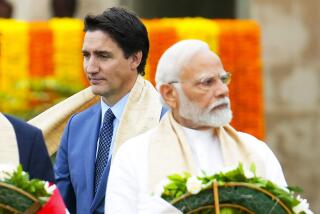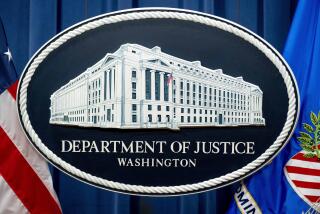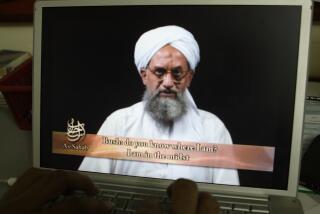Bin Laden Trail Still Cold, Pakistan Says
- Share via
ISLAMABAD, Pakistan — Despite a surge in arrests of Al Qaeda suspects, a senior Pakistani anti-terrorism official said investigators still had not found the trail of their main target, Osama bin Laden.
“You can only be sure you’re closing in on someone when you at least have a hint of his whereabouts,” Brig. Javed Iqbal Cheema said in an interview last week. “With regard to Osama bin Laden himself, I would say that we are not getting any substantial leads as yet.”
Cheema, head of the National Crisis Management Cell at the Interior Ministry, said Pakistan was “working hand in glove with the U.S. government” in a sweep that had netted more than a dozen suspects in the last two weeks. Among those detained was Ahmed Khalfan Ghailani, who had been indicted in the United States for his alleged role in the 1998 bombings of two American embassies in East Africa.
Pakistani intelligence sources say FBI agents are playing a crucial role in tracking suspects by intercepting cellphone calls and other actions.
One source familiar with the investigation said Washington had stepped up pressure on Pakistani authorities to turn their latest leads into the capture of more high-level targets before the U.S. presidential election in November.
Bush administration officials have warned that intelligence indicates Al Qaeda may be planning an attack before the election.
“The next month and a half is absolutely crucial,” said the Pakistani source, who spoke on condition that he not be identified because his superiors had not approved the interview. “The way the Americans are pressuring Pakistan, they want Osama bin Laden.”
Bush administration officials have denied U.S. media reports that the United States was pressuring Pakistan to capture or kill Bin Laden and other Al Qaeda fugitives before the election. National Security Council spokesman Sean McCormack told the New Republic, which published one such account, that U.S. policy on pursuing those fugitives was unchanged by the election schedule.
Last month’s capture of Mohammed Naeem Noor Khan, a 25-year-old Pakistani computer specialist suspected of operating an information hub for Al Qaeda, set off the latest wave of arrests, including 13 in Britain. U.S. investigators are pursuing leads based on his computer files.
A Western diplomat confirmed reports that laptop computers and dozens of computer disks contained surveillance reports and apparent plans for attacks in the United States.
Cheema confirmed news reports that after his arrest, Khan worked undercover with Pakistani authorities, sending e-mail messages to Al Qaeda members in several countries. But Khan’s cover apparently was blown when his name was leaked to the U.S. media.
Pakistani officials have made conflicting statements about the importance of Khan’s arrest in the broader war against the Al Qaeda terrorist network. Some raised expectations of a breakthrough in the nearly three-year hunt for Bin Laden and his top lieutenant, Ayman Zawahiri. Others have been more cautious.
In Dubai, United Arab Emirates, on Thursday, Pakistani Interior Minister Faisal Saleh Hayat told Arab satellite television that investigators had “penetrated deep inside this network.” He also seemed to suggest that recent arrests had brought Bin Laden and Zawahiri closer to capture.
“Undoubtedly, we have received some information, and all the arrests at the Al Qaeda leadership level bring us closer toward reaching the desired objective,” Hayat said.
Cheema, who is one of Hayat’s top aides, said the interior minister had been quoted out of context. Although Khan’s arrest was “a significant success,” it had not generated new momentum in the search for Bin Laden and his deputy, Cheema said.
“We should not be very optimistic,” he said. “Yes, we got 13 to 14 [Al Qaeda] people in the last two weeks’ time, but there is no reason for euphoria.”
Arrests of mid- and low-ranking Al Qaeda members such as Khan usually lead to more arrests over a period of 10 to 15 days, Cheema said. Then the surge slows, and investigators have to force new breaks in Al Qaeda’s defenses. The network’s cell structure isolates units from one another, limiting the damage when one is broken up.
Bin Laden was last heard in public on an audiotape broadcast in April. His last videotape was broadcast in September 2003, on the eve of the second anniversary of the Sept. 11 attacks. The satellite television station Al Jazeera, which aired the video, said it was produced in late April or early May 2003.
The Al Qaeda leader appeared gaunt and tired in the videotape. Cheema would not say whether there was any recent information on Bin Laden’s health, but said investigators were working on the assumption that he was alive.
Pakistan’s crackdown on Al Qaeda is complicated by another conflict: the 57-year dispute with India over the Kashmir region. Several militant groups allegedly trained and armed by the Pakistani military’s Inter-Services Intelligence agency, or ISI, to fight in Kashmir are allied with Al Qaeda.
Shedding those ties and removing Al Qaeda sympathizers from Pakistan’s security and intelligence services are among President Pervez Musharraf’s biggest and most dangerous challenges.
Some of the militant groups are splintering or spawning “freelance terrorists who are drifting away from the established organizations and setting up shop on their own,” said the Western diplomat, who spoke on condition of anonymity.
The groups have been involved in high-profile attacks in Pakistan, including at least one of two assassination attempts against Musharraf in December and an attempt in June to kill an army corps commander in the southern port city of Karachi.
The diplomat said Musharraf needed significant concessions from India to dismantle the militant groups. India and Pakistan are negotiating a possible bus link across the cease-fire line that would make it easier for Kashmiri families to reunite, but Musharraf needs much more than that, the diplomat said.
India’s government appears to believe that it doesn’t need to meet Musharraf halfway with a compromise on Kashmir because a new security fence and pressure from the U.S. are limiting militant infiltrations, the diplomat added.
“The Indians are asking, ‘Why should we settle for a tie when we can win?’ ” the diplomat said. “That’s seriously not good.... It will horribly undermine Musharraf. It will horribly undermine rapprochement with India.”
India’s approach will not work in the long term, the diplomat said. “It might buy them five years, maybe even a bit more,” the diplomat said. “But there are very serious grievances there.”
The United Arab Emirates recently returned militant leader Qari Saifullah Akhtar to Pakistan. He is suspected of masterminding last year’s assassination attempts against Musharraf and a suicide car bomb attack in July on Prime Minister-designate Shaukat Aziz.
Akhtar’s links to the conflict in Kashmir go back more than a decade. He once headed a leading militant force, Harkat Ansar, which kidnapped six Western tourists in 1995. One escaped, another was found beheaded, and three others, including an American, were never found. The body of the sixth hostage, a Briton, was exhumed in 1997.
Declared a terrorist group by the U.S., Harkat Ansar renamed itself Harkat Mujahedin, whose leader was Maulana Fazlur Rehman Khalil. He was also detained recently in Pakistan.
Khalil co-signed Bin Laden’s 1998 decree declaring it a Muslim’s duty to kill Americans and Jews. He also provided training camps for Bin Laden in Afghanistan, which the U.S. struck with cruise missiles after the 1998 embassy bombings.
During testimony in March to the U.S. commission investigating the Sept. 11 attacks, former national security advisor Samuel R. “Sandy” Berger drew a link between Pakistan’s military intelligence and Khalil’s operations in Afghanistan.
The cruise missile barrage in Afghanistan “killed, apparently, a number of Pakistani ISI -- Pakistani intelligence officials who were at the camps at the same time,” Berger said.
The timing of Khalil’s detention, on suspicion that he trained guerrillas to attack U.S. and allied forces in Afghanistan, suggests that Musharraf’s government may be taking a more aggressive line against militant leaders, whom many Pakistanis consider heroes.
Seven months ago, responding to a Times report that Khalil and his outlawed group were recruiting and training militants, Hayat, the Pakistani interior minister, dismissed him as a “small fish” who was being carefully monitored.
Musharraf has detained Khalil and other leaders of militant groups fighting in Kashmir, only to release them. Without a settlement in Kashmir, the Western diplomat said, it would be impossible for Musharraf to accuse militants fighting there -- with Pakistan’s support -- of a crime.
The Indian and Pakistani foreign ministers are scheduled to hold a summit Sept. 5-6 in New Delhi to review what progress has been made during several months of lower-level talks.
Musharraf recently said New Delhi had sent feelers on the Kashmir issue, which he planned to discuss with India’s new prime minister, Manmohan Singh, in New York on the sidelines of a U.N. General Assembly meeting next month.
Special correspondent Mubashir Zaidi contributed to this report.
More to Read
Sign up for Essential California
The most important California stories and recommendations in your inbox every morning.
You may occasionally receive promotional content from the Los Angeles Times.













